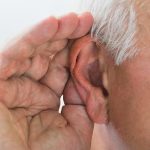Hearing loss can be avoided and reversed by taking the right vitamins, according to exciting NEW research
 (Naturalhealth365) Over 46 million Americans (half of all those over 60) are affected by age-related hearing loss – and experts are predicting that the number will swell to an astounding 82 million by 2040.
(Naturalhealth365) Over 46 million Americans (half of all those over 60) are affected by age-related hearing loss – and experts are predicting that the number will swell to an astounding 82 million by 2040.
Hearing loss can profoundly affect quality of life, with emotional costs including depression, memory problems, social withdrawal and isolation. However, exciting new research is revealing the ability of folate, a common B vitamin, to prevent, slow and possibly even reverse age-related hearing loss.
Inflammation and oxidative stress can trigger nerve damage and hearing loss
Age-related hearing loss, also known as sensorineural hearing loss, is often caused by damage to the tiny “hair cells” in the inner ear that are responsible for converting sound into nerve impulses. It can also involve damage to the cells that send those messages to the auditory centers of the brain.
No matter where the nerve cell damage occurs, the result is a “communications breakdown” that jeopardizes hearing. But, what causes these injuries to nerve cells?
Experts say that oxidative stress, chronic inflammation and mitochondrial dysfunction related to aging can all contribute to the problem.
The fact is: anything that damages the nervous system can damage sensorineural hearing. And, recent research is pointing towards elevated homocysteine as a major culprit as well.
Researchers say: Elevated homocysteine levels take a toll on hearing
High blood levels of homocysteine, an amino acid made in the body from the amino acid methionine, have been linked with heart disease, stroke and neurological conditions such as Alzheimer’s disease.
Researchers say elevated homocysteine levels can injure arterial walls and promote atherosclerosis – as well as damaging the nervous system. (In fact, elevated homocysteine is so detrimental that more than one researcher has likened it to a “dagger pointed at the heart.”)
And, high levels of homocysteine – as well as shortages in the vitamins needed to control it – are strongly linked to age-related hearing loss. In one study, researchers found that people with elevated homocysteine were 64 percent more likely to have hearing loss than those with normal levels.
High homocysteine levels can be caused by a variety of factors, including smoking, obesity, inactivity, aging, alcohol use, prescription drug use and heavy consumption of methionine-rich red meat and dairy products. Insufficient levels of B-vitamins – which help to clear homocysteine from the body – can also contribute.
Good news: B vitamins lower homocysteine and fight age-related hearing loss
Folate – also known as vitamin B9 – works with vitamin B-12 to convert homocysteine back to methionine and clear it from the body.
Studies have shown that people with age-related hearing loss have low folate levels – while people over 60 with normal hearing have normal folate levels to match.
In order to learn more about the role of folate in maintaining hearing, researchers fed healthy mice a folate-deficient diet – and found that their hearing quickly deteriorated. Upon examination, the team found that the mice had damage to the inner ears – with corresponding loss of hair cells.
The good news: Human studies have helped to confirm the benefits of folate supplementation for protecting and preserving hearing
In a 36-month placebo-controlled study of over 700 older adults published in Annals of Internal Medicine, researchers found that 800 mcg of folic acid (a form of folate) a day substantially slowed an age-related decline in the ability to hear and distinguish speech frequencies – a common problem in aged adults.
How can I use B vitamins to lower my homocysteine and support better hearing?
It is a wise move to have your homocysteine levels tested yearly, particularly if you are of mature years. According to natural health experts, homocysteine levels shouldn’t exceed 12 umol/L (micromoles per liter) – with 8 umols/L characterized as an “optimal” level.
Those with elevated homocysteine should begin prompt supplementation with a trio of B vitamins – folate, vitamin B6 (pyridoxine) and vitamin B12 (cobalamin) – which can successfully reduce homocysteine via the body’s natural detoxification pathways.
(Note: it’s best to opt for activated folate in the 5-MTHF, or 5-methyltetrahydrofolate, form. This potent formulation can achieve levels up to 700 percent higher than synthetic versions).
Some natural health experts recommend daily dosages of 50 mg of vitamin B6, 1,000 mcg of vitamin B12 and 400 to 800 mcg of folate to lower homocysteine – but discuss supplementation first with your experienced and knowledgeable integrative doctor, who can advise you on the proper dosage.
Your doctor may recommend other drug-free, natural means of slashing high homocysteine levels – including reducing intake of conventionally-raised (toxic) red meat and dairy products, reducing or sharply eliminating alcohol consumption and getting sufficient exercise.
Natural substances such as betain, choline, N-acetyl- L-cysteine, SAMe and taurine may also be helpful in lowering homocysteine.
Whether we’re listening for the voice of a loved one, the warble of a songbird or the strains of a favorite piece of music, our ability to hear and interpret sound is a priceless gift – and one that B-vitamin supplementation can help to protect and preserve.
Editor’s note: The NaturalHealth365 Store offers the finest quality B-vitamins on the market.Click here to order today!*
*And, yes, your purchases help to support our operations at NaturalHealth365.
Sources for this article include:


No comments:
Post a Comment